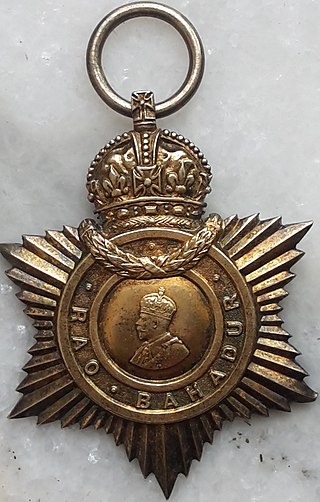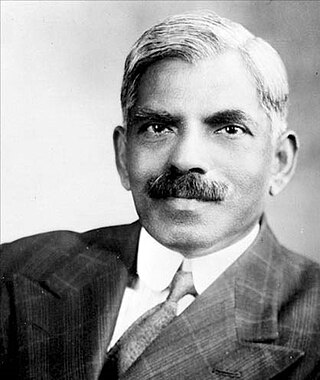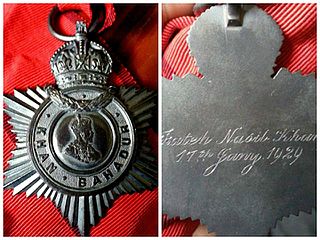Rao Saheb Gangadhara Ganapati Sastriar was an Indian civil servant and administrator who served as Diwan of Pudukkottai state from 25 October 1926 to 15 December 1926 and 28 February 1929 to 4 March 1931.
Rao Saheb Gangadhara Ganapati Sastriar was an Indian civil servant and administrator who served as Diwan of Pudukkottai state from 25 October 1926 to 15 December 1926 and 28 February 1929 to 4 March 1931.
Ganapati Sastriar was born on 5 March 1876 at Thiruvalangadu in the then Tanjore district to T. Gangadhara Sastri and his wife Janakiamma. Sastriar was educated at H. H. The Rajah's College, Pudukkottai from 1882 to 1892 and graduated from St. Joseph's College, Tiruchirappalli in 1894.
Sastriar was the elder brother to F. G. Natesa Iyer: one of the leading figures of the Indian National Congress during the Indian independence movement, from South India. Sastriar initially studied at Raja's College, Pudukottai, then at St. Joseph's College, Tiruchirapalli (1893–94): before getting a degree in law from Madras Law College.
The then Government of India conferred on him the title Rao Saheb on 1 March 1929. After retiring from Government service in 1931, he served as a member of the senate of the University of Madras from 1933 to 1936.

The Most Eminent Order of the Indian Empire is an order of chivalry founded by Queen Victoria on 1 January 1878. The Order includes members of three classes:
The three Round Table Conferences of 1930–1932 were a series of peace conferences, organized by the British Government and Indian political personalities to discuss constitutional reforms in India. These started in November 1930 and ended in December 1932. They were conducted as per the recommendation of Muhammad Ali Jinnah to Viceroy Lord Irwin and Prime Minister Ramsay MacDonald, and by the report submitted by the Simon Commission in May 1930. Demands for Swaraj or self-rule in India had been growing increasingly strong. B. R. Ambedkar, Jinnah, Sir Tej Bahadur Sapru, V. S. Srinivasa Sastri, Sir Muhammad Zafrulla Khan, K. T. Paul and Mirabehn were key participants from India. By the 1930s, many British politicians believed that India needed to move towards dominion status. However, there were significant disagreements between the Indian and the British political parties that the Conferences would not resolve. The key topic was about constitution and India which was mainly discussed in that conference. There were three Round Table Conferences from 1930 to 1932.
Rao Bahadur Sir Kurma Venkatareddi NaiduKCSI was an Indian politician, lawyer, diplomat, and professor who served as the Prime Minister of Madras Presidency. He also served as the Governor of Madras Presidency — one of the only two Indians in history to have held the post. He was the only person to have held both the posts of prime minister and Governor of the Madras Presidency. As a prominent leader of the Justice Party, he formulated policies that promoted social equality, abolition of untouchability, and social reform. He also established the first women's college in Andhra region in Eluru.

Rao Bahadur and Rai Bahadur, abbreviatedR.B., was a title of honour bestowed during British rule in India to individuals for outstanding service or acts of public welfare to the Empire. From 1911, the title was accompanied by a medal called a Title Badge. Translated, Rao means "King", and Bahadur means "Brave". Bestowed mainly on Hindus, the equivalent title for Muslim and Parsi subjects was Khan Bahadur. For Sikhs it was Sardar Bahadur.

Sir George Frederick Stanley was a British soldier and Conservative Party politician who served as a member of the UK Parliament for Preston and, later, Willesden East. He also served the Governor of Madras from 1929 to 1934 and as Acting Viceroy of India in 1934.

Sir Amaravati Seshayya Sastri, or Sashiah Sastri, was an Indian administrator who served as the Diwan of Travancore from May 1872 to 4 May 1877 and as the Diwan of Pudukkottai from 1878 to 1894. He is credited with having modernized the city of Pudukkottai.

SirArcot Ramasamy Mudaliar was an Indian lawyer, diplomat, and statesman who was the first president of the United Nations Economic and Social Council and the 24th and last dewan of Mysore. He also served as a senior leader of the Justice Party and in various administrative and bureaucratic posts in pre- and Independent India. He was a prominent orator and was known for his inspiring speeches.

Pudukkottai was a kingdom and later a princely state in British India, which existed from 1680 until 1948.
Diwan Bahadur Sir Mannath Krishnan NairKCIE (1870–1938) was an Indian politician from the Indian National Congress and later, Justice Party who served as a member of the Madras Legislative Council and later, executive council of the Governor of Madras. He also served as the Chief Justice of Travancore High Court and later Diwan of Travancore from 1914 to 1920(?)
The Government College (Autonomous) is located on the banks of River Godavari in Rajamahendravaram, Andhra Pradesh, India. It has been recognized as the 'College with Potential for Excellence' by the University Grants Commission in 2016.
M. V. Gangadhara Siva was an Indian politician and member of Indian Parliament.
Gangadhara Rama Rao was an Indian politician and zamindar of Pittapore in the Madras Presidency who served as a member of the Madras Legislative Council from 1878 to 1881.

Thanjavur District was one of the districts in the erstwhile Madras Presidency of British India. It covered the area of the present-day districts of Thanjavur, Tiruvarur, Nagapattinam, Mayiladuthurai and Aranthangi taluk, Karambakkudi taluk of Pudukkottai District in Tamil Nadu. Apart from being a bedrock of Hindu orthodoxy, Tanjore was a centre of Chola cultural heritage and one of the richest and most prosperous districts in Madras Presidency.

Rai Sahib / Rao Saheb / Roy Sahib / Rao Sahib abbreviated R.S., was a title of honour issued during the era of British rule in India to individuals who performed faithful service or acts of public welfare to the nation. From 1911 the title was accompanied by a special Title Badge. Translated, Rai means "King" Sahib means "Leader". Awarded during the reign of George VI. For another image of the badge see link This was the start level title usually awarded to civilians, which could later be upgraded to Rao Bahadur and then to Dewan Bahadur titles.

Charles William Egerton CottonCSI CIE was a British civil servant of the Indian civil service who served as Chief Secretary of Madras and the Agent of the Governor-General for the Madras States.

Sir Joseph William Bhore was an Indian civil servant and diwan of the Cochin State. He is best remembered for his chairmanship of the Health Survey and Development Committee that charted a course for public health investments and infrastructure in India.
Sastri is a surname. Notable people with the surname include:

Dewan Bahadur or Diwan Bahadur was a title of honour awarded during British rule in India. It was awarded to individuals who had performed faithful service or acts of public welfare to the nation. From 1911 the title was accompanied by a special Title Badge. Dewan literally means Prime Minister in Indian context and Bahadur means brave.
The New Year Honours 1913 were appointments by King George V to various orders and honours to reward and highlight good works by members of the British Empire. They were announced on 3 January 1913.

Khan Bahadur – a compound of Khan "Leader" and Bahadur "Brave" – was a honorary title in British India conferred on Indian subjects who were adherents of Islam or Zoroastrianism. The equivalent title for Hindus, Buddhists and Indian Christians was Rao Bahadur/Rai Bahadur and Sardar Bahadur for Sikhs. The title of Khan Bahadur was one degree higher than the title of Khan Sahib.